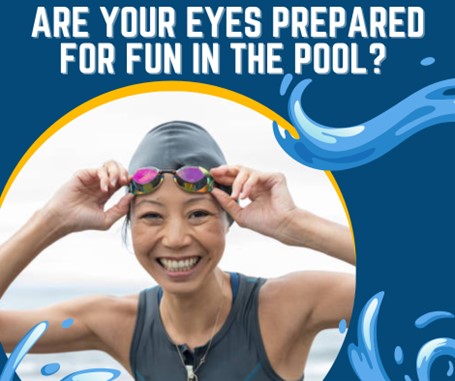
Having fun at the pool or doing water aerobics this summer can be a great way to cool off from the heat. Chlorine and Saline do a great job keeping the water clean, but they can also be hard on your eyes.
Pools Are Tough on the Tear Film
Chemicals in pool water wash away the tear film, a thin layer that coats the surface of our eyes. This tear film keeps our eyes moist, smooth, and clear. Chlorine and other chemicals used to keep pool water clean can wash away the moist layer of the tear film, leaving eyes uncomfortable and red. Without fully functioning tear film protection, eyes are exposed to harmful pool chemicals and lingering bacteria. Chlorine can cause a reaction, leaving the surface and edges of your eyes red, itchy, watery, and uncomfortable. The chlorine bacteria that survive can lead to an eye infection, such as the pink eye (conjunctivitis).
How to Protect Your Eyes While Having Fun at the Pool
- Wearing goggles whenever possible is the best way to prevent eye infections while swimming. Choose a pair that is the right size for you and forms a protective seal over your eyes.
- Chlorine and Saline play a role in disinfecting swimming pools. Failure to achieve the right balance can lead to eye irritation with burning, stinging, dryness, and redness. Another reason why protecting your eyes with goggles is so essential. The optimal pH balance for a swimming pool is approximately 7.4, which matches the eyes.
- Wear sunglasses to protect your eyes while outside but, most importantly, around a pool from overexposure to UV rays and discomfort from intense light.
- Stay hydrated and drink plenty of water for your overall health and to keep your eye film healthy.
- If you are a contact wearer, ditch the lenses. Wearing contact lenses in any type of water, including a pool, hot tub, ocean, or lake—puts you at high risk for corneal infection. Bacteria can grow on the lenses even after just one swim.
After a long day at the pool, if your once-clear view of a fun summer pool day becomes blurry or foggy, flush your eyes with a cool eye rinse, or try saline eye drops for quick relief. Don’t forget to add the eye drops to your favorite must-have items for your beach bag essentials this season!

References: American Academy of Ophthalmology and the American Optometric Association. This blog provides information and discussion about eye health and related subjects. The content provided within this blog and any linked materials are not intended and should not be considered medical advice. If the reader or any person has a medical concern, they should consult with an appropriately licensed physician.
